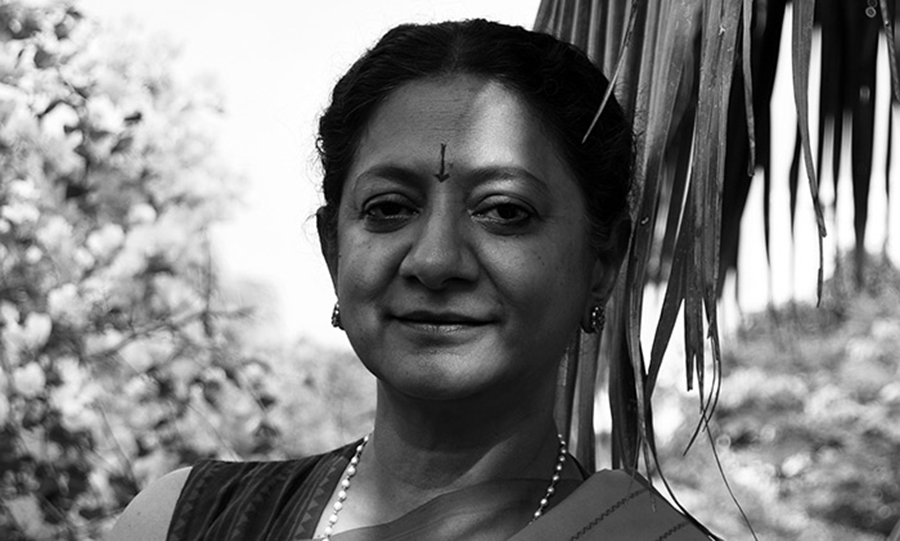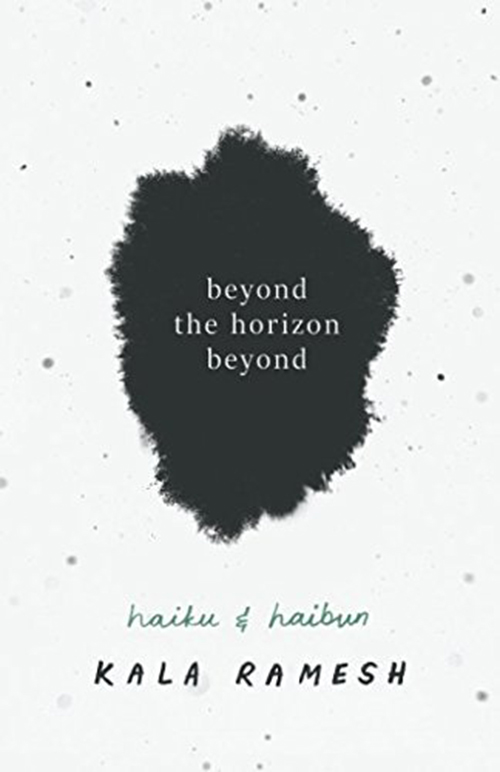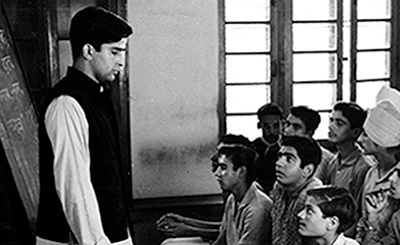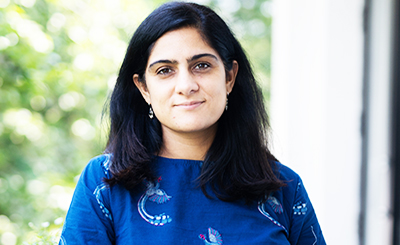
Kala Ramesh.
Kala Ramesh’s first book of haiku and haibun, beyond the horizon beyond, is a piece of cosmos ripped off to give us a glimpse of the vastness that lies beyond infinity
My tryst with poetry began and would have ended with Tagore, had I not been exposed to other forms and writers of this genre, though reading Tagore itself is oceanic. I do not know how I came to fall in love with poetry. It is somehow intertwined with my love for music. The lyrics of compositions, however simple and earthy, have always caught my attention which is kind of a contrast because in music the abstraction of sound or dhwani holds more significance than the words sung. As they say music begins where words fail.
Perhaps it is the limitation of words that attracted me to poems. The inherent rhythm and meter – the laya and chhand? I am not sure. I am also not sure whether I understand this genre very well. But again, herein lies the contradiction. We are not supposed to understand poetry. We are required to feel it and soak in the cadence so much so that the reader becomes one with it.
That brings me to the next most important point – the interpretive scope of poetry – its vastness and complexity; its personalization and at the same time the sense of detachment intrinsic to the form.
Talking of my own experience — I have crossed milestones after milestones as an ardent enthusiast of poetry from rhymes to open verses to minimalism. Of the three, I still have a crush for blank verses but it is the last which has taught me that nothing is the least where versification of thoughts is concerned. Today, therefore, let’s talk about minimalism. And what best than haiku which epitomizes minimization at its profoundest best!
Delving deeper, I would say it is just not the aura of wordlessness that is the hallmark of haiku, it is the wonderment of revelation, the bemusement of a serendipitous find, the verbosity of the unsaid interweaved in the matrix that set it apart from all the other formats of poetry.
To quote an example
morning raga
yesterday’s buds
in full bloom
The entire process of creation encapsulated in seven simple words!
That’s it….Compressing an enormity in a tightly corked bottle and then suddenly pulling the cork off to let out the dizzying fizz in one go so that it hits the reader like a bolt with a swooning momentum!
Somebody said in chaos there is cosmos and order belies a hurricane of disorder
the magician
surprised
by his own magic
I am sure that is how the super-creator must be feeling surveying his own creation – the Universe!!
Three lines pulling in an eternity
beyond
the horizon
beyond
Yes! I am talking about Kala Ramesh’s anthology of haiku and haibun captioned beyond the horizon beyond….the title itself is self- explanatory.
From why haiku I come to why Kala…
At times when visiting an art gallery you come across a painting that you keep staring at knowing not why. It is much later that you realize the layers in those shades, the emotions behind the imagery, theaesthetics beyond the painting. That is how Kala’s haiku works on me. I keep reading and re-reading till I am able to find myself in her words.
withered field—
slowly coming to terms
with my aborted child
The sheer pain of losing something which is very much a part of you – the conspicuousnessof its absence – its not being there but very much being there!!!And the realization of it – the bonding of pathos that threads through the earth to the sky………..and beyond… as Tagore would have said!!! The process of gathering, becoming and then severing away – a kaleidoscope of cosmic evolution infinite in its proposition endless in its continuum!!
At the cost of being criticized as a racist, I would say that it is the Indianness, so deeply entrenched in Kala’s haiku that resonates a chord in my heart. But then haiku is supposed to be country specific, isn’t it?
autumn lyrics
father talks about life
beyond death
And down the memory lane I toddle three decades back…..the quietly flowing Yamuna….the cold water lapping my feet. Sombre shades of night…the cooling of the ashes…..the irreplaceable loss of someone so dear……. shrinwantuvishweamritasyaputrah. We are all children of the Immortal….there is nothing called death….it is just the cyclic order of the cosmos….the consoling words of the priest had failed to give solace to a mind unsuccessfully grappling with the enormity of death.
burning ghat…
from the depths of grief
my friend’s off-key tune
This happenstance of just happening…. The minuscule existence…rather co-existence… in the mind-boggling vastness of this world…
on the lake
skimming stones, I am
where I am
And this one reminds me of Albert Einstein’s most famous quote: “The most incomprehensible thing about the world is that it is comprehensible. The fact that it is comprehensible is a miracle.” For us the most comprehensible thing about the world is that it is incomprehensible
everything
comes from the unborn…
spring song
That which is known germinates from the unknown. That which is born is a seedling of the unborn. This deeply embedded philosophy which connects the existing to the one which is omniscient, the visible to the invisible, the tangible to the intangible is the crux of Brahmavaad.
From the esoteric to the very earthy...
winter rain
a cadence
to our love making
So beautifully erotic… I can almost hear the music….of those unspoken, half uttered words in the dead of the night
raat gunti rahegi aadhi baat ko
aadhi baaton ki peed aadhi raat ko
Vasant Dev
Aamar na-bola baanir ghono jaaminir maajhe
Tagore
(My unspoken words in the dead of the night)

Haibun is a different cup of tea altogether. The tightly embedded prose in haikai language prefixed, suffixed or intercepted by haiku which shifts palpably from the prose yet links with it invariably is a reader’s delight.
Kala’s haibuns are word pictures where she experiments freely. There is one liner haibun (“A Level Ground”) seamlessly merging into a haiku. A prose written in free-verse style (“Kulfiwala”) tapering into a haiku. There are anecdotes,snatches of childhood memories and also occasional, and rather intentional, detours to third person accounts, yet every piece gracefully culminating into the present encapsulating the moment in a vibrantly visual haiku.
In the “Summer Snow” Kala subtly deals with mother-daughter relationship taking a new turn. The suddenness of the revelation is tempered with serendipitous realization like getting caught in an unannounced downpour.
caught unaware—
the thickness of rain
on the road
In “The Knot Remains”, the isolation of old age is so heartrendingly captured in
leafless tree
the sun rises
with a walking stick
In “The Twist” Kala’s son-in-law complements the way she maintains her car which almost looks new. But on his next visits, he gifts her two car fresheners which prompts Kala to write
banjo night
notes spin around
the dancer
Like the fragrance of the freshener which floats around the one on the steering wheel…??
Haiku is all about startling its readers out of ennui. That gasp which must also accompany the smile after reading one is a must for haiku. The nudging to wakefulness… the abruptness of the visual….and then the moment of epiphany…!!!
“as the sun dips into the horizon shadows slip away on a breath of fresh air I began to whistle a tune
A night of stars
My soul
All over the place”
And I hear Swamiji’s sonorous voice claiming with unshakable conviction
I am Existence Absolute
Knowledge Absolute
Bliss Absolute
I am He I am He
Swami Vivekananda
It is my sincere wish and hope that haiku, senryu, tanka and all other forms of Japanese poetry find a place in the syllabus of the Indian literati. Needless to say, Kala’s beyond the horizon beyond would be, as it is now, counted as one of the most priceless and powerful referral points to fathom the layers and depths of Indian Haiku in English in the context of India — its way of life and philosophy, it’s ethos and essence, its deep rooted culture and ethnicity.
Divided in to five parts corresponding to the five elements — Earth-Prithvi, Water-Jalam, Fire-Agni, Air-Vayu, Ether-Akash — personifying the interconnectedness of everything, Kala’s beyond the horizon beyond is a piece of cosmos ripped off to give us a deco of the vastness that lies beyond infinity. There are some books which you can never finish reading because at every turn of life when you again and again keep going back to it you will find newer meaning emerging, newer horizon enfolding and newer currents engulfing.
Therein lies the beauty of haiku and haibun….the story continues unpunctuated.
More from The Byword
Comments
*Comments will be moderated











